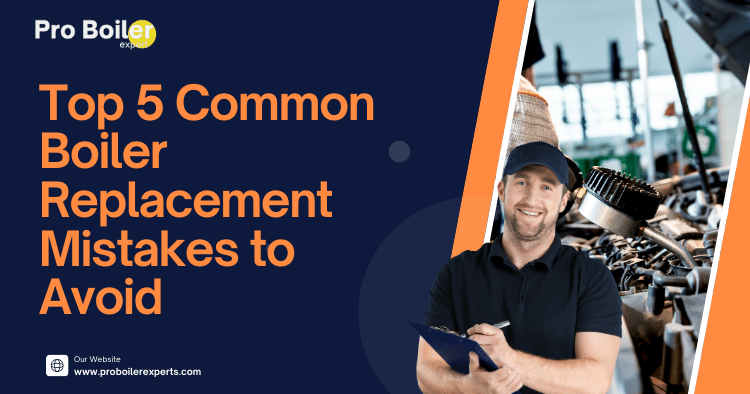Table of Contents
- Ignoring the Right Size
- Overlooking Energy Efficiency Ratings
- Neglecting Professional Installation
- Disregarding Local Regulations and Codes
- Failing to Consider Long-term Maintenance
Boiler replacements can be daunting, especially if you are not familiar with the ins and outs of heating systems. Many homeowners make costly mistakes during the process, leading to inefficient performance or even safety hazards. In this article, we’ll explore the top five common boiler replacement mistakes to avoid, ensuring your new heating system operates smoothly and efficiently.
1. Ignoring the Right Size
Choosing the right size boiler is crucial for optimal performance. An incorrectly sized boiler can lead to numerous issues, including increased energy bills and uncomfortable indoor temperatures.
Why Size Matters
- Too Small: A boiler that’s too small will struggle to meet your heating demands, resulting in inconsistent temperatures and overworking the unit, which may lead to breakdowns.
- Too Large: Conversely, an oversized boiler will cycle on and off more frequently, wasting energy and causing unnecessary wear and tear.
How to Determine the Right Size
To find the correct size, consider the following:
- Square Footage: Calculate the area of your home that requires heating.
- Insulation Levels: Homes with better insulation require less heating power.
- Climate: The average temperature of your region plays a significant role in sizing.
For a comprehensive guide on sizing your boiler, refer to the resources available on Energy.gov.
2. Overlooking Energy Efficiency Ratings
Energy efficiency ratings are essential for understanding how much energy your new boiler will consume. Many homeowners overlook this aspect, leading to higher operational costs in the long run.
Understanding Efficiency Ratings
Boilers are rated using the Annual Fuel Utilization Efficiency (AFUE) percentage, which indicates how much energy is converted into usable heat. A higher AFUE means better efficiency.
- 80% AFUE: 80% of the energy used is converted into heat.
- 90% AFUE or Higher: Considered high-efficiency models, offering significant savings.
The Cost-Benefit Analysis
While high-efficiency boilers might have a higher upfront cost, they often save money over time through lower energy bills. Use the table below to compare potential savings.
| Boiler Type | Average AFUE | Estimated Annual Cost | Potential Savings |
|---|---|---|---|
| Standard Boiler | 80% | $1,500 | – |
| High-Efficiency Boiler | 90% or higher | $1,200 | $300 |
Make sure to consult the U.S. Department of Energy for detailed information on efficiency standards.
3. Neglecting Professional Installation
Even the best boiler can underperform if it’s not installed correctly. Many homeowners think they can save money by attempting a DIY installation, but this often leads to more problems than it solves.
Why Professional Installation Matters
- Safety Concerns: Improper installation can lead to gas leaks, carbon monoxide poisoning, or fire hazards.
- Warranty Issues: Many manufacturers require professional installation to maintain the warranty.
- Optimal Performance: Professionals ensure everything is set up for maximum efficiency and longevity.
Finding the Right Installer
Look for licensed and experienced professionals in your area. Checking reviews and asking for recommendations can help you find someone you can trust.
For more information on choosing the right boiler installer, check out our guide on Top 5 Tips for Choosing the Right Boiler Installer.
4. Disregarding Local Regulations and Codes
Every locality has specific regulations regarding boiler installation, and failing to adhere to these can result in fines or forced removal of your system.
Key Regulations to Consider
- Permits: Many areas require permits for boiler installation.
- Safety Codes: Ensure your new boiler complies with local safety codes, including venting and clearance requirements.
How to Stay Compliant
Contact your local building department to understand the regulations in your area. They can guide you through the necessary permits and inspections.
For further details on compliance, refer to Essential Building Regulations for Boiler Installations 2024.
5. Failing to Consider Long-term Maintenance
Once you’ve replaced your boiler, regular maintenance is critical to its longevity and efficiency. Many homeowners neglect this aspect, leading to premature breakdowns and costly repairs.
Importance of Regular Maintenance
- Efficiency: Regular servicing ensures your boiler runs efficiently, helping to lower energy costs.
- Safety: Routine checks can identify potential issues before they become serious problems.
- Longevity: Just like a car, your boiler needs regular check-ups to ensure it lasts its expected lifespan.
Maintenance Tips
- Annual Inspections: Schedule yearly professional inspections.
For a detailed maintenance checklist, see our Essential Boiler Maintenance Tips.
- Keep it Clean: Regularly check and clean filters and vents to ensure optimal airflow.
- Monitor Performance: Pay attention to unusual noises or changes in heating patterns.
FAQs
Q: How often should I replace my boiler?
A: Generally, you should consider replacing your boiler every 15-20 years, depending on its efficiency and performance.
Q: Can I finance a new boiler?
A: Yes, many companies offer financing options to help spread the cost of a new boiler over time.
For financing options, refer to Top 5 Financing Options for Boiler Installation Costs.
Q: How can I improve my boiler’s efficiency?
A: Regular maintenance, proper insulation, and upgrading to a high-efficiency model are excellent ways to enhance efficiency.
By avoiding these common boiler replacement mistakes, you can ensure a smooth transition to a new heating system that meets your needs, operates efficiently, and keeps your home comfortable for years to come. Remember, whether it’s selecting the right size, considering energy efficiency, ensuring professional installation, adhering to local codes, or committing to maintenance, each step is crucial in the boiler replacement process. Happy heating!
Feel free to reach out if you have any questions or need further assistance in your boiler replacement journey!





